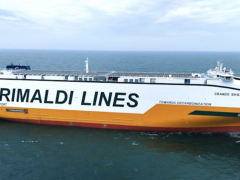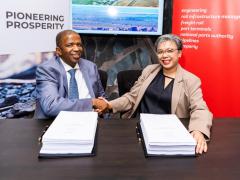Significant restructuring of staff and services is paying dividends for Zim Integrated Shipping Services South Africa. Nine months since managing director Yacov Barak took over the reins in South Africa, the company has moved from loss to break-even, and the foundations are now firmly in place for the line to move forward. The journey has been a difficult one, involving retrenchment of several staff at management level, but this formed part of the overall vision to turn the company into a lean and efficient machine, said Barak. “We downsized the Johannesburg office and centralised the operation in Durban, which was a good move. “We also implemented a new IT system – IQship – which has enabled us to reach our goal of issuing an invoice on the same day as the vessel sails, and the bill of lading a day after, as long as we get the shipping details on time.” A re-look at service patterns resulted in the termination of its monthly direct service to Israel and the Med. “But we have come up with a far better solution for our customers,” Barak explained. “Due to various port-related delays, the direct service offered a 35-day transit to Israel. By transhipping in Nava Sheva, we’ve cut the transit to 25-28 days and now provide a frequency every 11 days rather than once a month. The response from customers has been very positive, and on the most recent sailing we carried 48 reefers.” The quality of this service is helping Zim to win back its customers, and it’s now concentrating on imports from Turkey and Israel in order to increase its allocation for West Africa. According to Barak, West Africa traffic is booming and that’s an area of strong focus for the line, which currently calls Durban, Tema, Apapa and Abidjan to Nava Sheva, Mundra and Jebel Ali. Barak believes that East Africa is also a market of strong opportunity and is actively looking for a partner in order to reinstate its Mombasa and Dar es Salaam offering. While Barak concedes that times are tough for the shipping industry globally, he believes there are always opportunities. “My brief from the start was to minimise costs and increase efficiencies. This has been achieved, and the way forward now is growth and expansion.”












